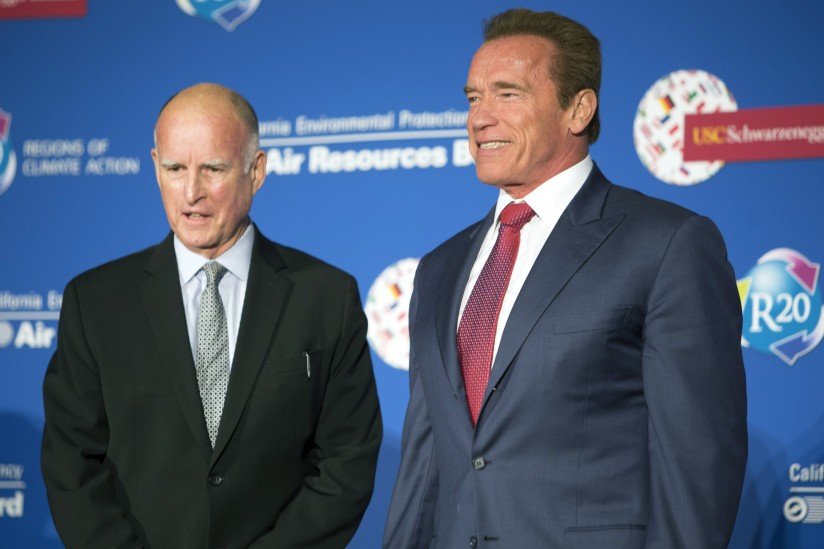
California Gov. Jerry Brown doesn’t travel much out of state, but amid intensifying conflict with Washington over health care, climate change, immigration and more, the governor of the nation’s most populous state will head east next week — his first trip to the nation’s capital since President Donald Trump’s inauguration.
The visit will come less than a week after Trump released a budget proposal that would cut deeply into social service programs and begin an easing of national vehicle emission standards — both anathema to policies in Brown’s heavily Democratic state. The governor called the environmental action “an unconscionable gift to polluters,” and California officials this week filed a motion in federal court to intervene in a lawsuit automakers brought against the U.S. Environmental Protection Agency.
Brown’s office included only one specific meeting in its announcement of the four-day trip, which begins Monday: a meeting of the Nuclear Threat Initiative’s board of directors, which Brown joined earlier this year. In a statement Saturday, Brown’s office said “additional meetings with government leaders and others will be added to the schedule.”
It’s unclear with whom Brown will seek meetings — or if they will include any Trump administration officials. The lack of scheduling is typical of the fourth-term Democrat, who eschews public schedules for the flexibility they deny him.
Brown traveled regularly out of state during his previous time as governor, from 1975 to 1983, and as in his three failed bids for president. Since returning to office in 2011, however, the 78-year-old Brown has largely limited his travel to events related to climate change. He skipped a meeting of the nation’s governors in Washington in February.
But Trump’s first months in office have expanded the range of issues with which California and Washington stand in conflict. On Twitter, Brown described a proposal by Republicans to repeal former President Barack Obama’s landmark health care overhaul as a “harebrained scheme” and “a really dumb idea” that he said would result in widespread suffering.
The state budget relies on more than $105 billion in federal funding. Following Trump’s budget release this week, Brown’s finance director, Michael Cohen, said in a prepared statement that “it’s hard to know where to begin.”
“The President’s Budget proposes a complete withdrawal of the federal government’s commitment to working with states to solve the critical issues of the country – from environmental protection and emergency preparedness to transportation and other infrastructure,” he said.
While Brown prepared to travel to Washington, his predecessor, Arnold Schwarzenegger, was expected to follow soon after, angered by proposed cuts to after-school programs, a cause of Schwarzenegger’s since before he was governor.
“It looks like I’ll be making another trip to Washington,” Schwarzenegger, who appeared on Capitol Hill in 2013 to lobby against proposed cuts to after-school programs, said on Twitter. “We’ve fought this fight over & over, and we’re undefeated.”
White House budget chief Mick Mulvaney on Thursday defended reductions to after-school programs, saying there is no evidence that they are effective.
While Brown has promised to confront Trump on issues ranging from immigration to health care and the environment, he has held out hope that Trump could prove helpful on infrastructure spending.
Brown is seeking to build a high-speed rail system and a $15.5 billion Delta water conveyance. Of Trump’s $1 trillion infrastructure proposal, Brown said in his State of the State address in January, “I say, amen to that, man!
http://www.politico.com/states/california/story/2017/03/jerry-brown-heads-to-dc-with-schwarzenegger-right-behind-him-110484